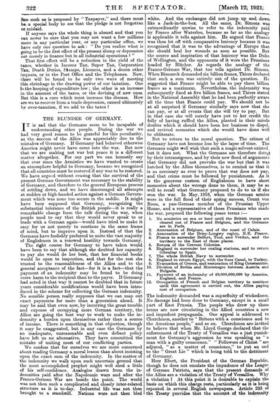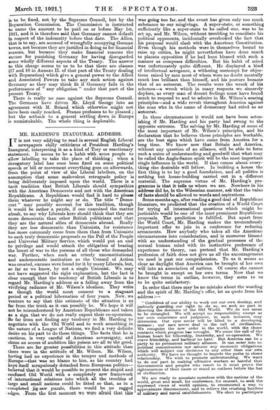THE BLUNDER OF GERMANY.
IT is sad that the Germans seem to be incapable of understanding other people. During the war we had very good reason to be grateful for this peculiarity, as the success of the Allies was appreciably due to the mistakes of Germany. If Germany had behaved otherwise America might never have come into the war. But now that we are making not war but peace it is a different matter altogether. For our part we can honestly say that ever since the Armistice we have wanted to create an atmosphere helpful to Germany, because we recognized that all countries must be restored if any was to be restored. We have argued without ceasing that the survival of the present German Government was necessary to the stability of Germany, and therefore to the general European process of settling down, and we have discouraged all attempts at sudden or high-handed action against a German Govern- ment which was none too secure in the saddle. It might have been supposed that Germany, recognizing the substantial tolerance of the British people—it is really a remarkable change from the talk during the war, when people used to say that they would never speak to or trade with a German again—would have tried to make it easy for us not merely to continue in the same frame of mind, but to improve upon it. Instead of that the Germans have foolishly preferred to unite the vast majority of Englishmen in a renewed hostility towards Germany. The right course for Germany to have taken would have been to say that although she doubted her capacity to pay she would do her best, that her financial books would lie open to inspection, and that for the rest she trusted to the reasonableness of the Allies and to the general acceptance of the fact—for it is a fact—that the payment of an indemnity may be found to be doing more harm to the recipient than to the payer. If Germany had acted in that way it cannot be doubted that in future years considerable modifications would have been intro- duced in the scheme for collecting the German indemnity. No sensible person really supposes that we can map out exact payments for more than a generation ahead. It may be said that even now, by incurring the great trouble and expense of occupying more German territory, the Allies are going the best way to work to make the in- demnity a burden upon themselves rather than a source of income. There is something in that objection, though it may be exaggerated, but in any case the Germans by an inadequate, unreasonable and even defiant policy have left us no alternative. They have committed the mistake of uniting most of our conflicting parties, We confess that for ourselves we are more concerned about reading Germany a moral lesson than about insisting upon the exact sum of the indemnity. In the matter of the indemnity we walk upon such uncertain ground that the most accomplished prophet might well shed a little of his self-confidence. Analogies drawn from the in- demnities paid after the Napoleonic wars and after the Franco-German War are beside the point. The world, was not then such a complicated and closely inter-related structure as it is to-day. Industrial life was not then brought to a standstill. Nations were not then bled white. And the exchanges • did not jump- up and down like a Jack-in-the-box. All the same, Dr. Simons Was extraordinarily unwise to refer to. the indemnity paid by France after Waterloo, because so far as the analogy is applicable it tells against him. He argued that France was then let off with comparative leniency because it was recognized that it was to the advantage of Europe that she should heal her wounds as soon as possible. But the source and inspiration of that leniency was the Duke of Wellington, and the opponents of it were the Prussians headed by Bliicher. As regards the analogy of the Franco-German War, that too tells against Dr. Simons.
When Bismarck demanded 'six billion francs, Thiers declared that such a sum was entirely out of the question. He suggested that France might be able to pay three billion francs as a maximum. Nevertheless, the indemnity was subsequently fixed at five billion francs, and Thiers stated in the National Assembly that he had been perfectly aware all the time that France could pay. We should not be at all surprised if Germany similarly says now that she can pay, or at all events that she will try to pay. But in that case she will merely have put to her credit the folly of having ruffled the Allies, planted in their minds doubts which it should have been her business to dispel, and revived memories which she would have done well to obliterate.
But to return to the moral question. The crimes of Germany have not become less by the lapse of time. The Germans might well wish that such a magic solvent existed.
but it does not. What the Germans are therefore doing by their intransigence, and by their new flood of arguments that Germany did not provoke the war but that it was hatched by the Allies themselves, is to remind us that it is as necessary as ever to prove that war does not pay, and that crime must be followed by punishment. As it is the generous custom of Englishmen to have short memories about the wrongs done to them, it may be as well to recall what Germany proposed to do to us if she won the war. In May, 1918, when the German armies were in the full flood of their spring success, Count von Roon, a pan-German member of the Prussian Upper House, and a representative of those Prussians who made 'the war, proposed the following peace terms :-
1. No armistice on sea or land until the British troops are cleared out of France and Belgium, and the Germans are in Paris.
2. Annexation of Belgium, and of the coast of Calais.
3. Annexation of the Briey-Longwy region, N.E. France. 4. France to surrender Seifert, Toul, and Verdun, and the territory to the East of those places. 5. Return of the German Colonies.
6. England to surrender her coaling stations, and to return Gibraltar to Spain.
7. The whole British Navy, to surrender.
8. England to return Egypt, with the Suez Canal, to Turkey. 9. Evacuation of Greece, and restoration of King Constantine.
10. Division of Serbia and Montenegro between Austria and Bulgaria. 11. Payment of an indemnity of £9,000,000,000 by America, England, and France. 12. Occupation of French and Belgian territory to continue until this agreement is carried out, the Allies paying cost of occupation.
The indemnity demanded was a superfluity of wickedness. No damage had been done to Germany, except in a small part of East Prussia. The people who drew up those terms are now circulating in the Allied countries a new and impudent propaganda. One appeal is addressed to Churchmen, another to " Britons with a conscience and to the American people," and so on. Churchmen are. invited to believe that when Mr. Lloyd George declared that the enforcement of the Treaty of Versailles was a just punish- ment for Germany's aggression he was speaking as " a man with a guilty conscience." " Followers of Christ " are adjured, " as a matter of conscience," to put an end to the " Great Lie " which is being told to the detriment of Germany.
Herr Ebert, the President of the German though he does not emulate the impudence of the League of German Patriots, says that the present demands of the Allies are a violation of the Treaty-of Versailles. Why a violation At this point it is desirable to explain the basis on which this charge rests, particularly as it is being repeated in several. English newspapers.. Article 233 of the Treaty provides that the amount of the indemnity je to be fixed, not by the Supreme Council, but by the Reparation Commission. The Commission is instructed to name the amount to be paid on or before May 1st, 1921, and it is therefore said that Germany cannot default In respect of the indemnity before that date. The Allies, that is to say, are accused of wrongfully occupying German towns, not because they are justified in doing so for financial reasons, but because they make financial reasons the excuse for punishing Germany for having disregarded some wholly different aspects of the Treaty. The answer to this charge seems to us to be that there are clauses (17 and 18 in Annexe II. of that part of the Treaty dealing with Reparation) which give a general power to the Allied and Associated Powers to take any such action against Germany as they may think fit if Germany fails in the performance of " any obligation " under that part of the present Treaty. There is really no case against the Supreme Council. The Germans have driven Mr. Lloyd George into an agreement with M. Briand which otherwise might not have been easily reached. France professes to be pleased ; but the setback •to a general settling down in Europe is unmistakable. The whole thing is deplorable.



































 Previous page
Previous page